Monthly Archives: May 2022
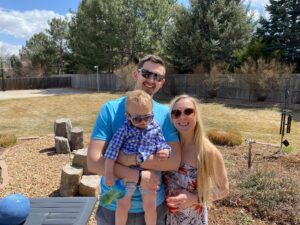
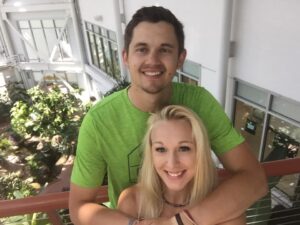 My grandniece, Katy Herr has been living the dream lately…well, for the past several years really. Katy’s life did a complete 180° turn in 2019, when she met her future husband, Dylan Herr. Dylan was different than anyone else Katy had ever known. Dylan was her soulmate. Before Dylan, Katy really felt like life was passing her by. She wanted to be a wife and mother, and none of that was working out.
My grandniece, Katy Herr has been living the dream lately…well, for the past several years really. Katy’s life did a complete 180° turn in 2019, when she met her future husband, Dylan Herr. Dylan was different than anyone else Katy had ever known. Dylan was her soulmate. Before Dylan, Katy really felt like life was passing her by. She wanted to be a wife and mother, and none of that was working out.
Today, Katy is married to Dylan, and they have a beautiful little boy named Max, who is almost two years old. Together, Katy’s men have made her life as close to perfect as it gets. To make life even better, Katy and Dylan recently bought a new house…their first together, and they just couldn’t be happier. They had moved from Brighton, Colorado to Casper, Wyoming to open a new store, Dylan and his family own and operate a number of Red Wing Shoe Stores. They will be stationed here, but Dylan will likely have to travel to the other stores periodically. That said, since they can, Katy and Max will probably go along, so they can all visit with Dylan’s family. Katy and Dylan are also enjoying their roles as community representatives. They are very active in fund raisers and other ways to make our community a better place to live. They rather love the dressing up for date night aspect of all that being community representative entails.
Katy is very much enjoying being a stay-at-home wife and mom, and Max keeps her very busy, as any two-year-old child will do. She also has a beautiful home that she is working on making their own. They also enjoy 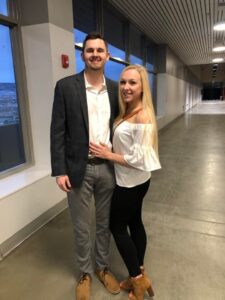
 going to the lake. Katy pretty much grew up around Alcova Lake, because her grandparents, Chip and Trish Burgess had a cabin at the lake. I’m sure that Max will be as much a “fish” as Katy and her brother, Keifer were. Katy and Dylan also love to tour area gardens and parks. Max loves to be outside and to play in the grass and on the swings. The whole family enjoys their time together and with other family members. These days, things are going great for Katy, and I’m sure it will only get better. She has so much life to look forward too. Today is Katy’s birthday. Happy birthday Katy!! Have a great day!! We love you!!
going to the lake. Katy pretty much grew up around Alcova Lake, because her grandparents, Chip and Trish Burgess had a cabin at the lake. I’m sure that Max will be as much a “fish” as Katy and her brother, Keifer were. Katy and Dylan also love to tour area gardens and parks. Max loves to be outside and to play in the grass and on the swings. The whole family enjoys their time together and with other family members. These days, things are going great for Katy, and I’m sure it will only get better. She has so much life to look forward too. Today is Katy’s birthday. Happy birthday Katy!! Have a great day!! We love you!!
 As another year has come and gone, I find myself again saddened that our cousin, Larry Hein is no longer with us. How could it be that he has been in Heaven now for almost a year and a half? Larry was a wonderful son, brother, and dad. He was also a successful businessman in Forsyth, Montana, and many people in town were helped by his mechanical ability and his towing business. Life wasn’t always easy for Larry. He lost his wife to an auto accident and was left to raise his children alone. He did a good job with that, and by the time he went to Heaven, his youngest child, Destiny was almost grown, and his son, Dalton was a grown man. I know they were so sad that he was no longer with them, but they were also grateful that they had him for most of their childhood years.
As another year has come and gone, I find myself again saddened that our cousin, Larry Hein is no longer with us. How could it be that he has been in Heaven now for almost a year and a half? Larry was a wonderful son, brother, and dad. He was also a successful businessman in Forsyth, Montana, and many people in town were helped by his mechanical ability and his towing business. Life wasn’t always easy for Larry. He lost his wife to an auto accident and was left to raise his children alone. He did a good job with that, and by the time he went to Heaven, his youngest child, Destiny was almost grown, and his son, Dalton was a grown man. I know they were so sad that he was no longer with them, but they were also grateful that they had him for most of their childhood years.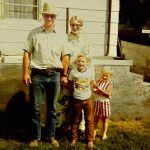
I remember Larry as a young boy, because I married his cousin, Bob when Larry was just six years old. He was a good boy, and when my own children, Corrie Petersen and Amy Royce came along, Larry would go out to the playhouse on Grandma and Grandpa Hein’s house, and even though he was a boy, he was willing to playhouse with the girls, because they needed a “daddy” for the “family” game they were playing. While I’m sure Larry was quite bored, he was a good sport, and took it all in stride, even to caring for the baby dolls they were using for the kids.
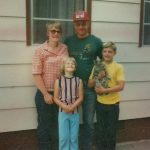
Larry loved being out at Grandma Hein’s house, as we all did. There was always something to do and everyone had a great time. Grandma and Grandpa made life a big game…even if the kids were actually helping with the chores. And, they learned responsibility and good values, because they really did help around the ranch. They also got to ride the horses and help with the other animals that were being raised. Larry was a good help, as were the other kids, and they were all a blessing to Grandma and Grandpa Hein. Tody would have been Larry’s 53rd birthday. Happy birthday in Heaven, Larry. I know you are all celebrating there. We love and miss you very much.
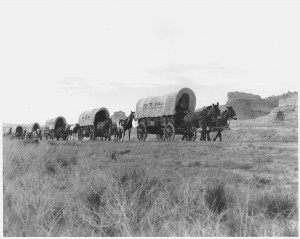
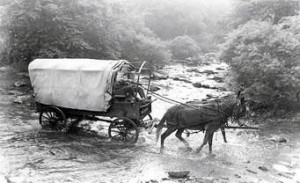 It was inevitable really…the migration of the people of the United States to the west coast, in search of gold, adventure, and more land. The east was filling up, and there was no place else to go, but west. Of course, many people would either not make it all the way to the West; choosing rather to homestead along the way, die, or actually make it to the West, and then return to the East. Nevertheless, before anyone could find out is life on the west coast suited them or not, they had to get to the west coast, and on May 16, 1842, the first major wagon train to the northwest departed from Elm Grove. Missouri, on the Oregon Trail. This was a little bit of a risky move, because US sovereignty over the Oregon Territory was not clearly established until 1846.
It was inevitable really…the migration of the people of the United States to the west coast, in search of gold, adventure, and more land. The east was filling up, and there was no place else to go, but west. Of course, many people would either not make it all the way to the West; choosing rather to homestead along the way, die, or actually make it to the West, and then return to the East. Nevertheless, before anyone could find out is life on the west coast suited them or not, they had to get to the west coast, and on May 16, 1842, the first major wagon train to the northwest departed from Elm Grove. Missouri, on the Oregon Trail. This was a little bit of a risky move, because US sovereignty over the Oregon Territory was not clearly established until 1846.
Nevertheless, American fur trappers and missionary groups had been living in the region for decades, along with Indians who had settled the land centuries earlier. Of course, everyone out there had a story to tell, and there were dozens of books and lectures that proclaimed Oregon’s agricultural potential. You can’t tell a story without creating interest somewhere. Even a boring story is of interest to someone, and this was no boring story. With the books and lectures coming out of the West, the white American farmers were very interested. They saw a chance to make their fortune, or at least to become independent. The actual first overland immigrants to Oregon, intended to farm primarily. A small band of 70 pioneers left Independence, Missouri in 1841. The stories they had heard from the fur traders brought them along the same route the traders had blazed, taking them west along the Platte River through the Rocky Mountains via the easy South Pass in Wyoming and then northwest to the Columbia River…basically through some on my own stomping grounds. Eventually, the trail they took was renamed by the pioneers, who called it the Oregon Trail.
The migration, once started, had little chance of being stopped, and in 1842, a slightly larger group of 100 pioneers made the 2,000-mile journey to Oregon. With the success of these two groups, the inevitable happened, accelerated in a major way by the severe depression in the Midwest, combined with a flood of propaganda from fur traders, missionaries, and government officials extolling the virtues of the land. They may have had good intentions, but it is never a good idea to lie to the public. With the disinformation on their minds, farmers dissatisfied with their prospects in Ohio, Illinois, Kentucky, and Tennessee, hoped to find better lives in the supposed paradise of Oregon. With that another type of “rush” began. Much like the “gold rush” years, the farmers saw the land as their “gold” and headed west.
So, on this day in 1843, approximately 1,000 men, women, and children climbed aboard their wagons and steered their horses west out of the small town of Elm Grove, Missouri. It was the first real wagon train, comprised of more than 100 wagons with a herd of 5,000 oxen and cattle trailing behind. The train was led by Dr Elijah White, a Presbyterian missionary who had made the trip the year before. At first the trail was fairly easy, traveling over the flat lands of the Great Plains. There weren’t many obstacles in that area, and few river crossings, some of which could be dangerous for wagons. The bigger risk in the early days was the danger of Indian attacks, but they were still few and far between…at first anyway. The wagons were drawn into a circle at night to give the pioneers better protection from any attack that might come. They were very afraid of the Indians, who were enough different that they seemed deadly…to the pioneers anyway, and the Indians fear the White Man because of their weapons, and they were angry because the White Man wanted the land. In reality, the pioneers were far more in danger from seemingly mundane causes, like the accidental discharge of firearms, falling off mules or horses, drowning in river crossings, and disease. The trail became much more difficult, with steep ascents and descents over rocky terrain, after the train entered the mountains. The pioneers risked injury from overturned and runaway wagons.
Nevertheless, the wagon trains persevered, and the migrant movement continued until the West was populated. As for the 1,000-person party that made that original journey way back in 1843…the vast majority survived to reach their destination in the fertile, well-watered land of western Oregon. The next migration, in 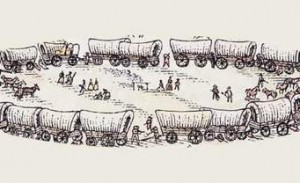
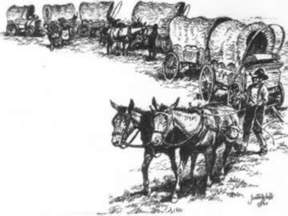 1844 was smaller than that of the previous season, but in 1845 it jumped to nearly 3,000. Migration to the West was here to stay and the trains became an annual event, although the practice of traveling in giant convoys of wagons soon changed to many smaller bands of one or two-dozen wagons. The wagon trains really became a thing of the past in 1884, when the Union Pacific constructed a railway along the route.
1844 was smaller than that of the previous season, but in 1845 it jumped to nearly 3,000. Migration to the West was here to stay and the trains became an annual event, although the practice of traveling in giant convoys of wagons soon changed to many smaller bands of one or two-dozen wagons. The wagon trains really became a thing of the past in 1884, when the Union Pacific constructed a railway along the route.
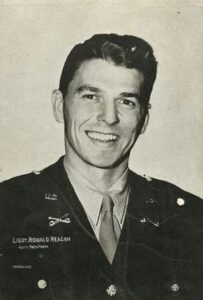
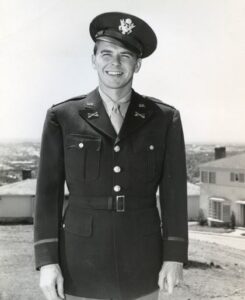 It’s almost unheard of to have a cavalry officer suddenly completely move in a different direction, and become an Army Air Force officer, but on May 15, 1942, Lieutenant Ronald Reagan, who had enlisted in the Army in 1935, was a cavalry officer at the time, applied for reassignment to the Army Air Force. Switching from the Army to the Army Air Force, while not unheard of, was an unusual event, especially in that no one really expected to be in the service for an extended period of time. For the most part, during World War II, it had been agreed upon that the soldier would be returned to the United States by February 1946. That said, it didn’t always make sense to make such a big move as switching branches of service.
It’s almost unheard of to have a cavalry officer suddenly completely move in a different direction, and become an Army Air Force officer, but on May 15, 1942, Lieutenant Ronald Reagan, who had enlisted in the Army in 1935, was a cavalry officer at the time, applied for reassignment to the Army Air Force. Switching from the Army to the Army Air Force, while not unheard of, was an unusual event, especially in that no one really expected to be in the service for an extended period of time. For the most part, during World War II, it had been agreed upon that the soldier would be returned to the United States by February 1946. That said, it didn’t always make sense to make such a big move as switching branches of service.
Then Lieutenant Ronald Reagan was, at least at that time, mostly looking to have a career in acting, and it was here that he would eventually put his thespian background to use making World War II propaganda films. Once his transfer was approved on June 9, 1942, Reagan was given a job as a public relations officer for the First Motion Picture Unit. The First Motion Picture Unit (FMPU) produced military training, morale, and propaganda films to aid the war effort. FMPU released Frank Capra’s “Why We Fight” series and a documentary of the bomber Memphis Belle, the crew of which completed a standard-setting 25 bombing missions in Europe for the first time. No other plane and crew, to that date, had managed to fly the 25 missions and make it back. War was a dangerous lifestyle for the Allied planes. The films were screened on domestic training grounds and in troop camps overseas as well as in movie theaters at home. The Memphis Belle documentary gave people hope that it could be done, and all was not lost.
Reagan did several other films, one of which, “Air Force,” which was later renamed “Beyond the Line of Duty.” That movie told the true story of the heroic feats of aviator Shorty Wheliss and his crew. Reagan narrated the film. While the documentary was originally intended simply to promote investment in war bonds, it won an 
 Academy Award in 1943 for best short subject. Reagan went on to narrate or star in three more shorts for FMPU including “For God and Country,” “Cadet Classification,” and “The Rear Gunner.” Reagan also appeared as Johnny Jones in the 1943 full-length musical film This is the Army. Of course, as we all know, Ronald Reagan’s true destiny was to become one of our greatest presidents of all time and a very brave man.
Academy Award in 1943 for best short subject. Reagan went on to narrate or star in three more shorts for FMPU including “For God and Country,” “Cadet Classification,” and “The Rear Gunner.” Reagan also appeared as Johnny Jones in the 1943 full-length musical film This is the Army. Of course, as we all know, Ronald Reagan’s true destiny was to become one of our greatest presidents of all time and a very brave man.
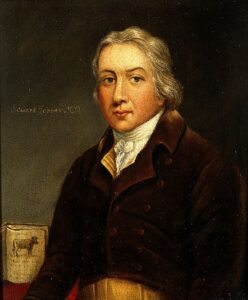 When we think of vaccinations, most of us think of modern-day medicine, but that wasn’t always the case. There have been serious diseases out there for centuries, and in fact, since Biblical days. Many of those diseases have been cured these days, or they are at least manageable, but in the 1700s, a disease like Smallpox was deadly. Others like Leprosy were just as bad. I’m sure that any doctor in those days cringed at having to make a diagnosis like that, because he knew that he was pronouncing a death sentence on his patient, and basically all he could do was to tell them to get their affairs in order and go into hiding to die, because their case was one with no hope of survival.
When we think of vaccinations, most of us think of modern-day medicine, but that wasn’t always the case. There have been serious diseases out there for centuries, and in fact, since Biblical days. Many of those diseases have been cured these days, or they are at least manageable, but in the 1700s, a disease like Smallpox was deadly. Others like Leprosy were just as bad. I’m sure that any doctor in those days cringed at having to make a diagnosis like that, because he knew that he was pronouncing a death sentence on his patient, and basically all he could do was to tell them to get their affairs in order and go into hiding to die, because their case was one with no hope of survival.
Vaccinations, for any disease, start out as trial and error, and Smallpox was no exception to that rule, but Edward Jenner, while still a medical student noticed that milkmaids who had contracted a disease called cowpox, which caused blistering on cow’s udders, did not catch smallpox. Unlike smallpox, which caused severe skin eruptions and dangerous fevers in humans, cowpox led to few ill symptoms in these women. I guess it takes a 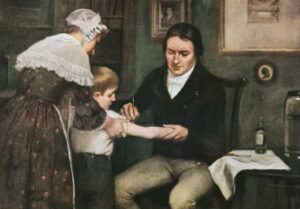 medically trained mind to connect the two situations and find whatever small similarity there is between the two diseases…and then decide to experiment with a possibility that no one else saw…or to decide not to.
medically trained mind to connect the two situations and find whatever small similarity there is between the two diseases…and then decide to experiment with a possibility that no one else saw…or to decide not to.
Jenner was that kind of a medical mind. By 1796, Jenner was an English country doctor, who hailed from Gloucestershire. On May 14, 1796, he took fluid from a cowpox blister and scratched it into the skin of James Phipps, an eight-year-old boy. A single blister rose up on the spot, but James soon recovered. On July 1, Jenner inoculated the boy again, this time with smallpox matter, and amazingly, no disease developed. The vaccine was a success. The medical world at the time, went wild. Doctors all over Europe soon adopted Jenner’s innovative technique, leading to a drastic decline in new sufferers of the devastating 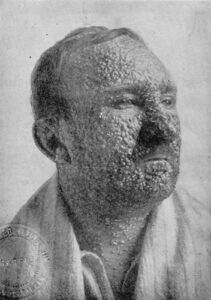 disease, as well as many lives saved.
disease, as well as many lives saved.
Following Jenner’s model, scientists in the 19th and 20th centuries, scientists developed new vaccines to fight numerous deadly diseases, among them polio, whooping cough, measles, tetanus, yellow fever, typhus, and hepatitis B. The lists of vaccines, goes on and on, all using the same model. More sophisticated smallpox vaccines were also developed and by 1970 international vaccination programs, such as those undertaken by the World Health Organization, had eliminated smallpox worldwide. Many people, these days would question the World Health Organization, and its motives, but there was a time that vaccines were very helpful and saved a lot of lives. I think it is sad that politics has made its entrance into the world of vaccines, because the lack of trust we have now is making the World Health Organization more of a hindrance than a help.

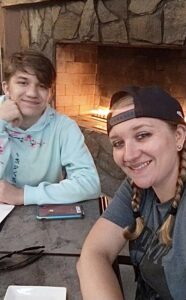 Working in a fast-food restaurant is often how someone gets started in a career in the culinary arts. Of course, that is how lots of kids get started in the work world too. My niece, Andrea Beach is an excellent cook and baker, and she really wanted to be a chef and even wanted to go to Culinary School, but like many people with that dream, she later became discontented with that line of work. Once you have been around restaurant life, you know that you will be working long hours, late at night, for people who are seldom satisfied, and somehow always think it is the fault of the chef. You might think I am talking about a chef that isn’t very good at his or her job, but I’m not. That is how it is for every chef or cook I know. People go out for a meal, and they somehow seem to think that if they don’t complain about the meal, they aren’t sophisticated enough…and I’m very serious about that.
Working in a fast-food restaurant is often how someone gets started in a career in the culinary arts. Of course, that is how lots of kids get started in the work world too. My niece, Andrea Beach is an excellent cook and baker, and she really wanted to be a chef and even wanted to go to Culinary School, but like many people with that dream, she later became discontented with that line of work. Once you have been around restaurant life, you know that you will be working long hours, late at night, for people who are seldom satisfied, and somehow always think it is the fault of the chef. You might think I am talking about a chef that isn’t very good at his or her job, but I’m not. That is how it is for every chef or cook I know. People go out for a meal, and they somehow seem to think that if they don’t complain about the meal, they aren’t sophisticated enough…and I’m very serious about that.
This was the world Andrea found herself, and she suddenly knew that it was time for a change. So, this single mom took a leap of faith and switched careers. Now she works at Ace Hardware. This was a career move sent to Andrea by God…literally. She loves her job, and her stress levels have dropped dramatically. The hours are better, which has made it possible for her to spend more time with her son, Topher who is a junior in high school. That last year of high school is so important to a student, and Topher is such a good kid. He and his mom ae best friends. She loves that the hours are better, as is the lower stress atmosphere.
Now that Andrea’s stepdad, Mike Reed is getting ready to retire, Andrea and Topher are looking at this being their last year in Rawlins. Now that her mom, Caryl Reed and Mike, are moving to Casper, Andrea is ready to start a new life in Casper as well. Andrea is listening to see what God has in store for her next. Planning a 
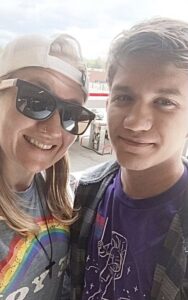 move to a new city without a job or anything can be stressful, but Caryl and Mike have an apartment above their barn on the ranch they are moving to, so Andrea and Topher will have a place to live right away. Of course, a lot will depend on what Topher’s plans are for the next year too. College could take him a totally different direction, so time will tell. Nevertheless, Andrea knows that she wants to be in Casper, at least for the near future. After that…well, who knows. She is listening to hear Gods plans for her and Topher’s future. She loves the Lord and trusts in Him completely. In the very near future, Andrea is looking forward to the vacation trip to Montana and Yellowstone with her mom, Caryl and Topher. That should be a great time for all three of them. Today is Andrea’s birthday. Happy birthday Andrea!! Have a great day!! We love you!!
move to a new city without a job or anything can be stressful, but Caryl and Mike have an apartment above their barn on the ranch they are moving to, so Andrea and Topher will have a place to live right away. Of course, a lot will depend on what Topher’s plans are for the next year too. College could take him a totally different direction, so time will tell. Nevertheless, Andrea knows that she wants to be in Casper, at least for the near future. After that…well, who knows. She is listening to hear Gods plans for her and Topher’s future. She loves the Lord and trusts in Him completely. In the very near future, Andrea is looking forward to the vacation trip to Montana and Yellowstone with her mom, Caryl and Topher. That should be a great time for all three of them. Today is Andrea’s birthday. Happy birthday Andrea!! Have a great day!! We love you!!
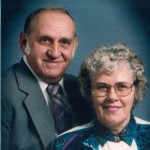
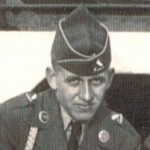 My uncle, Larry Byer was a really good musician, but that was not something I recall from years of hearing him play. It is something I’ve been told over the years. I never occurred to me that so many people in my family were talented musicians, but apparently there were a number of them. Uncle Larry played the guitar, the mandolin, and the piano. My grandfather, his dad, George Byer played the mandolin and the violin. My dad, Al Spencer and my Uncle George both played guitars. They had a regular band, and their jam sessions were like a big party at the Byer house. I knew that my dad, Al Spencer and his siblings were talented musicians, because I was told that over the years, but Uncle Larry is on my mom, Collene Spencer’s side of the family, and somehow, I just didn’t know. It’s possibly because by the time I was born, Uncle Larry was married, and starting a family of his own with his wife, Jeanette Morton. In fact, their son, Larry is just nine months younger than I am. These days, most of these band members are playing in Heaven, and I would sure love to hear that music.
My uncle, Larry Byer was a really good musician, but that was not something I recall from years of hearing him play. It is something I’ve been told over the years. I never occurred to me that so many people in my family were talented musicians, but apparently there were a number of them. Uncle Larry played the guitar, the mandolin, and the piano. My grandfather, his dad, George Byer played the mandolin and the violin. My dad, Al Spencer and my Uncle George both played guitars. They had a regular band, and their jam sessions were like a big party at the Byer house. I knew that my dad, Al Spencer and his siblings were talented musicians, because I was told that over the years, but Uncle Larry is on my mom, Collene Spencer’s side of the family, and somehow, I just didn’t know. It’s possibly because by the time I was born, Uncle Larry was married, and starting a family of his own with his wife, Jeanette Morton. In fact, their son, Larry is just nine months younger than I am. These days, most of these band members are playing in Heaven, and I would sure love to hear that music.
Uncle Larry was always a guy with a great sense of humor. He loved a good joke, and maybe that was what my Aunt Jeanette first saw in her husband of 55 years, before he went home to be with the Lord. Uncle Larry loved a good joke and wasn’t above pulling pranks either. I suppose he came by it honestly. I think just about everyone in my family…from both sides are tricksters and pranksters, and it had to come from somewhere, so I think there are a number of the aunts and uncles who had a hand in it. My mom was born between the two brothers in the family, and so she got a double portion of the pranks boys tend to play. Personally, I think she totally loved being the girl between the boys, because they included her in all the mischief.
Like all of my veteran loved ones, I am very proud that my Uncle Larry served in the Korean War. He didn’t talk much about his time in the service, but like most of the men of the war eras, he was proud to serve his 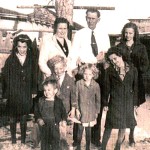
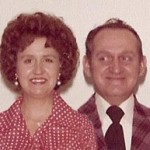 country. Uncle Larry was an honorable man and an honorable soldier. After that he came home and started a family with his best friend and wife, Jeanette Morton. They married on February 11, 1956, and their first child, Larry was born on February 9, 1957. Tina followed on November 12, 1958. Uncle Larry worked for many years at Texaco Refinery, and when they closed down there, he transferred to Louisiana, until his retirement. Today would have been Uncle Larry’s 88th birthday. Happy birthday in Heaven, Uncle Larry. We love and miss you very much.
country. Uncle Larry was an honorable man and an honorable soldier. After that he came home and started a family with his best friend and wife, Jeanette Morton. They married on February 11, 1956, and their first child, Larry was born on February 9, 1957. Tina followed on November 12, 1958. Uncle Larry worked for many years at Texaco Refinery, and when they closed down there, he transferred to Louisiana, until his retirement. Today would have been Uncle Larry’s 88th birthday. Happy birthday in Heaven, Uncle Larry. We love and miss you very much.
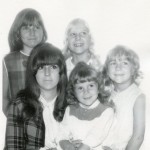
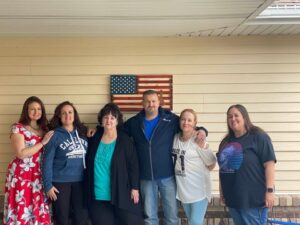 My sister, Cheryl Masterson is the oldest of the five girls that my parents had. For me, the second child, maybe more than the others, Cheryl was a mentor of sorts. As the sister who was just two years younger, following the footsteps of my big sister was just what I wanted to do. She was always the cool one. She could dance, and I was really awkward in that department, no matter how hard I tried to learn the latest dance steps from her, I just didn’t have the moves. She never ridiculed me, which she might have been justified in doing, but rather just showed me again.
My sister, Cheryl Masterson is the oldest of the five girls that my parents had. For me, the second child, maybe more than the others, Cheryl was a mentor of sorts. As the sister who was just two years younger, following the footsteps of my big sister was just what I wanted to do. She was always the cool one. She could dance, and I was really awkward in that department, no matter how hard I tried to learn the latest dance steps from her, I just didn’t have the moves. She never ridiculed me, which she might have been justified in doing, but rather just showed me again.
Today, my sister is once again becoming a mentor, as we move through these chaotic times in the history of our nation. The worse things get, the more Cheryl encourages all of my sisters and me to press into God. While things seem to be heading in the wrong direction, we all know that God has a plan for us all. We are seeing such a great turnaround in our nation. The faith of many is being tested, and it is up to us to find out where we are in our faith life’s. Cheryl is very rooted and grounded in her faith. She is in the word pretty much every free moment she has.
Cheryl is also very family oriented. Her whole family comes to her house to have dinner on Tuesdays, and they have a wonderful time. Cheryl has five children, 15 grandchildren (two who live in Heaven now), and six great grandchildren. Of course, they can’t always make it to her house, but they try to get there. Her youngest granddaughter, Aleesia Spethman, is the granddaughter who is after her heart. They are two if a kind, and they 
 love to spend quality time together. In fact, Cheryl and Aleesia are so close that they try to spend time together almost every day. These are sweet times for my sister, who knows that the years go by too quickly and there will come a day when Aleesia is more interested in friends than spending time with her grandma. Nevertheless, Cheryl has been a wonderful mentor to Aleesia too, and that will go with Aleesia all of her life. Today is Cheryl’s birthday. Happy birthday Cheryl!! Have a great day!! We love you!!
love to spend quality time together. In fact, Cheryl and Aleesia are so close that they try to spend time together almost every day. These are sweet times for my sister, who knows that the years go by too quickly and there will come a day when Aleesia is more interested in friends than spending time with her grandma. Nevertheless, Cheryl has been a wonderful mentor to Aleesia too, and that will go with Aleesia all of her life. Today is Cheryl’s birthday. Happy birthday Cheryl!! Have a great day!! We love you!!
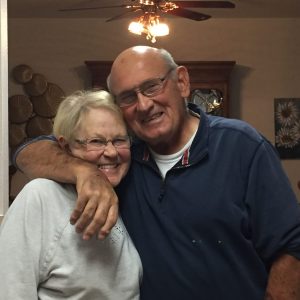 Our aunt, Charlys Schulenberg is such a sweet, beautiful person, inside and out. She is friendly and loving, and always wants to make sure everyone who comes to visit is sufficiently spoiled. Aunt Charlys is a great cook and makes things you won’t get anywhere else. If you leave her house hungry, it’s your own fault. Aunt Charlys and her husband, Bob’s uncle, Butch Schulenberg live in Forsyth, Montana, so we don’t get to see them often, but it is always a special treat when we do. They are both very interesting people with many stories to tell about their childhoods and the events that took place in those years. History doesn’t just happen in the Old West or centuries ago, history can be events that just happened a few days ago, or as was the case with Uncle Butch, and Aunt Charlys, the years when they were kids, and well as stories about their kids’ lives, which is always interesting.
Our aunt, Charlys Schulenberg is such a sweet, beautiful person, inside and out. She is friendly and loving, and always wants to make sure everyone who comes to visit is sufficiently spoiled. Aunt Charlys is a great cook and makes things you won’t get anywhere else. If you leave her house hungry, it’s your own fault. Aunt Charlys and her husband, Bob’s uncle, Butch Schulenberg live in Forsyth, Montana, so we don’t get to see them often, but it is always a special treat when we do. They are both very interesting people with many stories to tell about their childhoods and the events that took place in those years. History doesn’t just happen in the Old West or centuries ago, history can be events that just happened a few days ago, or as was the case with Uncle Butch, and Aunt Charlys, the years when they were kids, and well as stories about their kids’ lives, which is always interesting.
Aunt Charlys and Uncle Butch have a very nice place in Forsyth, Montana on the edge of town, overlooking the Yellowstone River. I can’t think of a more peaceful place than that. It is quiet and the views from their home are spectacular. It is a beautiful place, and very peaceful. We loved it and wished our visit could have been longer. Our visit was such a great blessing to us. Aunt Charlys is truly one of the nicest people I know.
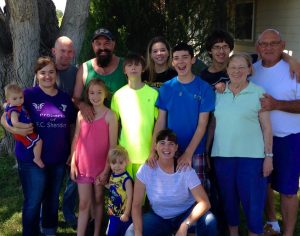
Aunt Charlys and Uncle Butch are all about family. They love their three kids, Tadd, Andi Kay, and Heath very much. They also have seven grandkids, and some of them are in sports, which means trips to watch them play…and nobody has to ask them twice. They are ready to go. They love watching the games and cheering for their grandkids, as well as all the local teams in Forsyth. Aunt Charlys and Uncle Butch are very community minded, and they are an asset to their community. Everyone loves them, and they love the people of their community too. I just wish they lived a little closer so we could visit more often. Today is Aunt Charlys’ birthday. Happy birthday Aunt Charlys!! Have a great day!! We love you!!
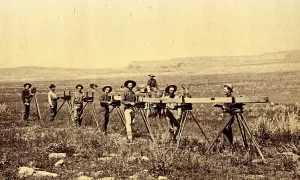 The job of marking out the boundaries of a property, much less an entire nation, while maybe not a complicated job, a big job, nevertheless. The 19th century surveyors were charged with the job of mapping out the entire United States, and to me, that is a huge undertaking. These men were more than just surveyors. These men were the unheralded vanguards of the Old West. They established original geographical boundaries and retraced and identified existing borders in accordance with legal descriptions. It is said that they were part-astronomers, part-geologists, part-engineers, and these mapmakers were also arbitrators when land lines were in dispute. Several wars, and many smaller feuds have been fought and people killed over boundary disputes, and sometimes the surveyor had to be called in to settle the matter.
The job of marking out the boundaries of a property, much less an entire nation, while maybe not a complicated job, a big job, nevertheless. The 19th century surveyors were charged with the job of mapping out the entire United States, and to me, that is a huge undertaking. These men were more than just surveyors. These men were the unheralded vanguards of the Old West. They established original geographical boundaries and retraced and identified existing borders in accordance with legal descriptions. It is said that they were part-astronomers, part-geologists, part-engineers, and these mapmakers were also arbitrators when land lines were in dispute. Several wars, and many smaller feuds have been fought and people killed over boundary disputes, and sometimes the surveyor had to be called in to settle the matter.
Some famous men that we all know started out as surveyors. Men like George Washington, Thomas Jefferson, Abraham Lincoln, Meriwether Lewis, William Clark and Daniel Boone When these men were surveyors, actually risked their lives in the line of duty to map what ultimately became the passes, railroads, towns, dams and other structures that helped form the backbone of the West.
Surveyors were the ones who shaped Western history. Their endurance, sense of adventure, and knowledge of precision tools and mathematical principles became the tools of their trade. In fact, they really became Jocks of all trades. While surveying the many miles of the United States, the had to actually blaze trails, so they had to become woodsman, so they could get through some areas to even begin surveying the borders. They became experts in the science of soil management and crop production. As agronomists they worried that hot weather, combined with dry conditions, can hamper pollination. They had to understand the soil and botany. They had to find their food in the wild, because there weren’t any stores in the rugged, wilderness they were mapping.
It was a hard job, and there were many risks, but these men were strong-willed, and determined…and sometimes their lives were on the line. In 1838, came one of the first incidence of a surveyor being killed. It happened just two years after the Battle of San Jacinto…a battle in which the Texians defeated Mexican General Antonio López de Santa Anna. While surveying on the Guadalupe River north of San Antonio, Indians attacked a survey party and killed nine of the crew, including one surveyor who managed to carve his name, “Beatty,” on a tree before he died. At least seven more survey parties were attacked that spring and summer, from the Rio Frio to the Red Sometimes River.
The surveyors were essential when the railroad was being built. The surveyors were the ones who marked out 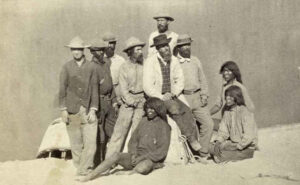 that track lines. They had to make sure they were not overtaking the landowners’ boundaries. The Indians were the main people to fight the surveyors, because they could see more and more of their land being confiscated. What would eventually be good, even for them, was seen as theft to them, and maybe it was, but when we look to the future, it’s easy to see that the land was going be essential to the people of the United States down the road. Nevertheless, the surveyors faced many dangers and really also had to be soldiers, because they were often in a fight for their lives, as they did their work. Surveyors were, and still are, essential to the ever-changing boundry lines in our nation, but that doesn’t make their job an easy one.
that track lines. They had to make sure they were not overtaking the landowners’ boundaries. The Indians were the main people to fight the surveyors, because they could see more and more of their land being confiscated. What would eventually be good, even for them, was seen as theft to them, and maybe it was, but when we look to the future, it’s easy to see that the land was going be essential to the people of the United States down the road. Nevertheless, the surveyors faced many dangers and really also had to be soldiers, because they were often in a fight for their lives, as they did their work. Surveyors were, and still are, essential to the ever-changing boundry lines in our nation, but that doesn’t make their job an easy one.

